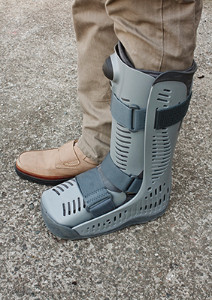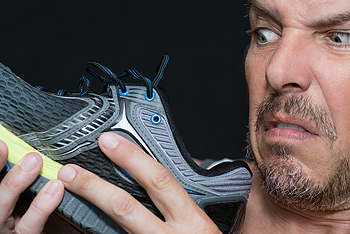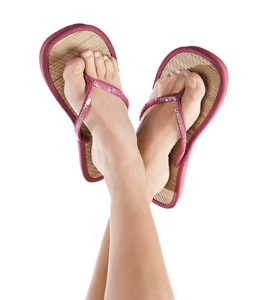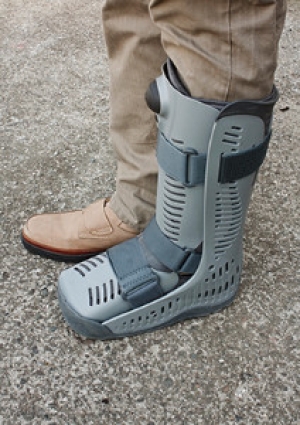
Diabetic Foot Care
Diabetes affects millions of people every year. Blood vessels located all over the body are damaged due to diabetes—even the blood vessels of the feet. Neuropathy, or nerve damage, can result from slower blood flow in the legs and feet. In diabetic patients, neuropathy is very important to monitor, as diabetics are at risk for developing ulcers.
Always washing and thoroughly drying the feet are pertinent parts of diabetic foot care. There should be a focus on cleaning between the toes. Even if no pain is felt, the entire foot should be examined for redness and sores. Neuropathy can often mask the pain of sores and ulcers and can cause these conditions to be overlooked. Use a mirror to examine the underside of your feet if needed. It is recommended that diabetics wear well-fitting socks.
Patients with diabetes should have their doctor monitor their blood levels because blood sugar levels play a huge role in diabetic care. Monitoring these levels on a regular basis is highly advised. It is very important to keep your blood sugar levels in the normal range, which can be determined by your physician. There are medications that may be prescribed to help with any neuropathy experienced by the diabetic patient. It is also advisable to visit a podiatrist if one is experiencing any conditions involving the feet, such as ingrown toenails, which in more severe cases can cause infection.
Diabetic feet must be inspected daily. Diabetic foot care at home is possible if a patient is provided with instructions from their podiatrist. Patients can relieve dry heels with creams or ointments. Suspected wounds should warrant an immediate call to the podiatrist. Gangrene is a serious problem for diabetics and can lead to sepsis and amputation in its worst cases. Early treatment and daily inspection of diabetic feet are keys to staying healthy.
Tips for Buying New Sneakers
 Before you purchase a new pair of running shoes, there are a few rules you should keep in mind to help you get the best value for your money. It is important that you follow these guidelines, because running shoes are supposed to support your entire body, in addition to your feet. One of the biggest mistakes you can make is to get pulled into the hype of a new sneaker release. Avoid letting a name brand determine the type of shoes you decide to put on your feet. It is also best to avoid buying running shoes online because it will be nearly impossible to determine how supportive or comfortable the shoes will be on your feet. Another helpful tip to consider when shopping for shoes is to walk around in the store with them on; this will help ensure that they fit comfortably without being too tight.
Before you purchase a new pair of running shoes, there are a few rules you should keep in mind to help you get the best value for your money. It is important that you follow these guidelines, because running shoes are supposed to support your entire body, in addition to your feet. One of the biggest mistakes you can make is to get pulled into the hype of a new sneaker release. Avoid letting a name brand determine the type of shoes you decide to put on your feet. It is also best to avoid buying running shoes online because it will be nearly impossible to determine how supportive or comfortable the shoes will be on your feet. Another helpful tip to consider when shopping for shoes is to walk around in the store with them on; this will help ensure that they fit comfortably without being too tight.
If you are a runner, wearing the right running shoe is essential. For more information, contact one of our podiatrists from Summit Podiatry. Our doctors can provide the care you need to keep you pain-free and on your feet.
Choosing the Right Running Shoe for Your Foot Type
To increase performance and avoid the risk of injury, it is important to choose the right running shoe based on your foot type. The general design of running shoes revolves around pronation, which is how the ankle rolls from outside to inside when the foot strikes the ground.
- Neutral runners are able to choose from a wide variety of shoes, including minimalist shoes or even going barefoot.
- Runners who overpronate, or experience an over-abundance of ankle rolling, should choose shoes that provide extra motion control and stability.
- Runners who underpronate, or supinate, have feet that have high arches and lack flexibility, preventing shock absorption. They require shoes with more flexibility and cushion.
If you have any questions please feel free to contact one of our offices located in Wilmington, Whiteville, and Wallace, NC . We offer the newest diagnostic and treatment technologies for all your foot and ankle needs.
Choosing the Right Running Shoe for Your Foot Type
Running may seem like a simple to do. However, running is actually a complex movement that puts stress on the ligaments, bones, and joints of the body. Selecting the correct running shoe is important for increasing performance and avoiding risk of injury. Running shoes should be selected based on your foot type. Considerations such as trail versus road shoes are important. Your foot type dictates the degree of cushioning, stability and motion control you require. The most accurate way to learn your foot type is to visit a local shop that specializes in running shoes. Professionals can measure your arch type, stride and gait and help you with your shoe needs.
The design of running shoes is created around the idea of pronation. Pronation is the natural rolling movement of your ankle from the outside to inside when your foot strikes the ground. If you run properly you strike the ground on the outside of your heel and roll in the direction of your big toe before pushing off once more. Pronation is beneficial because it assists the lower half of your body in absorbing shock and storing energy. Those considered neutral runners pronate correctly and do not need running shoes that help correct their form. Neutral runners can choose from a wide variety of shoes, including barefoot or minimal types. However, those who have arch problems or who adopt an incorrect form while running may experience too much or too little pronation. They may require running shoes that offer additional support.
Those who overpronate experience an over-abundance of ankle rolling. Even while standing, those who severely overpronate display ankles that are angled inward. It is not uncommon for them to have flat feet or curved legs. The tendency to overpronate may cause many injuries. Areas that tend to become injured are the knees, ankles, and Achilles tendon. If you find that you have a tendency to overpronate, you should look at shoes that provide extra stability and motion-control. Motion-control shoes are straight and firm. Shoes of this type do not curve at the tip. The restricted flexibility along the middle of the shoe prohibits the foot from rolling too far inward as your foot strikes the ground.
A less common problem is underpronation. Underpronation, also called supination, is when the feet are unable to roll inward during landing. Those who underpronate have feet that lack flexibility and high arches. This prevents any kind of shock absorption, even though it does place less rotational stress on ankles and knees. This added force can cause fractures, ligament tears, and muscle strains because the legs are trying to compensate for the impact. Those who underpronate need shoes with more cushioning and flexibility. If you have a tendency to underpronate, selecting stability or motion-control shoes may cause you more problems by continuing to prevent pronation.
Types of Foot Surgery
 If you should develop a bunion on the side of your big toe, you may want to consider permanent removal of this condition by having surgery performed. This particular procedure is referred to as an osteotomy, and may be effective in diminishing any pain that is associated with it. Additionally, a foot condition that is known as hammer toe may benefit by being surgically corrected. This type of surgery typically involves eliminating the joint appearing deformed, that is located between the toes, and may result in the toes becoming more flexible. Surgery that is referred to as an ankle fusion, may be beneficial in helping to heal ankle arthritis, which may be a result of a condition that is known as osteoarthritis. If you are afflicted with an Achilles tendon injury, surgery may be a reasonable option, which may eliminate the swelling and pain that is often associated with this ailment. If you are suffering from a severe foot malady, please consult with a podiatrist for a correct diagnosis and the best course of treatment, which may include surgery.
If you should develop a bunion on the side of your big toe, you may want to consider permanent removal of this condition by having surgery performed. This particular procedure is referred to as an osteotomy, and may be effective in diminishing any pain that is associated with it. Additionally, a foot condition that is known as hammer toe may benefit by being surgically corrected. This type of surgery typically involves eliminating the joint appearing deformed, that is located between the toes, and may result in the toes becoming more flexible. Surgery that is referred to as an ankle fusion, may be beneficial in helping to heal ankle arthritis, which may be a result of a condition that is known as osteoarthritis. If you are afflicted with an Achilles tendon injury, surgery may be a reasonable option, which may eliminate the swelling and pain that is often associated with this ailment. If you are suffering from a severe foot malady, please consult with a podiatrist for a correct diagnosis and the best course of treatment, which may include surgery.
Foot surgery is sometimes necessary to treat a foot ailment. To learn more, contact one of our podiatrists of Summit Podiatry. Our doctors will assist you with all of your foot and ankle needs.
When Is Surgery Necessary?
Foot and ankle surgery is generally reserved for cases in which less invasive, conservative procedures have failed to alleviate the problem. Some of the cases in which surgery may be necessary include:
- Removing foot deformities like bunions and bone spurs
- Severe arthritis that has caused bone issues
- Cosmetic reconstruction
What Types of Surgery Are There?
The type of surgery you receive will depend on the nature of the problem you have. Some of the possible surgeries include:
- Bunionectomy for painful bunions
- Surgical fusion for realignment of bones
- Neuropathy decompression surgery to treat nerve damage
Benefits of Surgery
Although surgery is usually a last resort, it can provide more complete pain relief compared to non-surgical methods and may allow you to finally resume full activity.
Surgical techniques have also become increasingly sophisticated. Techniques like endoscopic surgery allow for smaller incisions and faster recovery times.
If you have any questions please feel free to contact one of our offices located in Wilmington, Whiteville, and Wallace, NC . We offer the newest diagnostic and treatment technologies for all your foot and ankle needs.
Foot Surgery
In most cases, foot surgery is often chosen as the last available option for conditions that have otherwise been unsuccessfully treated. Surgery may be necessary for several reasons, including the removal of foot deformities (e.g. bone spurs or bunions), arthritis problems, reconstruction due to injury, and congenital malformations (e.g. club foot or flat feet). Regardless of one’s age, foot surgery may be the only successful option for treatment for certain conditions.
The type of surgery one undergoes depends on the type of foot condition the patient has. For the removal of a bunion growth, a bunionectomy is necessary. If the bones in the feet need to be realigned or fused together, a surgical fusion of the foot is needed. For pain or nerve issues, a patient may require surgery in which the tissues surrounding the painful nerve are removed. Initially, less invasive treatments are generally attempted; surgery is often the last measure taken if other treatments are unsuccessful.
While in many cases surgery is often deemed as the final resort, choosing surgery comes with certain benefits. The associated pain experienced in relation to the particular condition is often relieved with surgery, allowing patients to quickly resume daily activities. The greatest benefit, however, is that surgery generally eliminates the problem immediately.
Podiatry history has shown that foot treatments continue to evolve over time. In the field of foot surgery, endoscopic surgery is just one of the many advanced forms of surgery. As technology vastly improves so too will the various techniques in foot surgery, which already require smaller and smaller incisions with the use of better and more efficient tools. Thanks to such innovations, surgery is no longer as invasive as it was in the past, allowing for faster and easier recoveries.
Similar Symptoms Exist Between Broken Ankles and Sprained Ankles
 If you have ever experienced a broken ankle, you are most likely familiar with the severe pain and discomfort that is often associated with it. It may be difficult to differentiate between a fracture and a sprain due to the fact that most symptoms may be similar. These may include bruising, swelling, and the inability to walk because of the pressure the ankle must endure. For severely broken ankles, the bone may protrude from the skin and prompt treatment is recommended. An X-ray is typically performed to confirm if the ankle is broken or sprained. It’s suggested to consult with a podiatrist who can examine the broken ankle and discuss proper treatment options.
If you have ever experienced a broken ankle, you are most likely familiar with the severe pain and discomfort that is often associated with it. It may be difficult to differentiate between a fracture and a sprain due to the fact that most symptoms may be similar. These may include bruising, swelling, and the inability to walk because of the pressure the ankle must endure. For severely broken ankles, the bone may protrude from the skin and prompt treatment is recommended. An X-ray is typically performed to confirm if the ankle is broken or sprained. It’s suggested to consult with a podiatrist who can examine the broken ankle and discuss proper treatment options.
Broken ankles need immediate treatment. If you are seeking treatment, contact one of our podiatrists from Summit Podiatry. Our doctors can provide the care you need to keep you pain-free and on your feet.
Broken Ankles
A broken ankle is experienced when a person fractures their tibia or fibula in the lower leg and ankle area. Both of these bones are attached at the bottom of the leg and combine to form what we know to be our ankle.
When a physician is referring to a break of the ankle, he or she is usually referring to a break in the area where the tibia and fibula are joined to create our ankle joint. Ankles are more prone to fractures because the ankle is an area that suffers a lot of pressure and stress. There are some obvious signs when a person experiences a fractured ankle, and the following symptoms may be present.
Symptoms of a Fractured Ankle
- Excessive pain when the area is touched or when any pressure is placed on the ankle
- Swelling around the area
- Bruising of the area
- Area appears to be deformed
If you suspect an ankle fracture, it is recommended to seek treatment as soon as possible. The sooner you have your podiatrist diagnose the fracture, the quicker you’ll be on the way towards recovery.
If you have any questions, please feel free to contact one of our offices located in Wilmington, Whiteville, and Wallace, NC . We offer the newest diagnostic and treatment technologies for all your foot care needs.
All About Broken Ankles
Broken ankles are a serious injury that can lead to an inability to walk, function, and also cause a significant amount of pain. A broken ankle is a break in one of the three bones in your body that connect at the ankle joint: the tibia, the fibula, and the talus. The tibia and fibula are your two primary leg bones that connect at the knee, which sit directly upon the talus bone. This is protected by a fibrous membrane that allows for movement in the ankle joint. A broken ankle is usually caused by the foot rolling under or twisting too far, causing one of these three bones to snap.
A broken ankle is different from an ankle sprain, which occurs when the ankle ligaments are ripped or torn but no bones have been broken. A sprain can still be very severe, causing bruising in the foot and an inability to hold your own weight, much like a broken ankle would. If you’re unable to stand, and suspect that you have a broken ankle, the first thing to do would be to get an immediate X-ray to determine the severity of the break.
A common cause of broken ankles is when the ankle is rolled over with enough pressure to break the bones. This usually happens during exercise, sports, or other physical activity. Another common cause is a fall or jump from a tall height.
One immediate treatment for pain relief is elevating the foot above your head to reduce blood flow to the injured area. You can also apply ice packs to your ankle to help reduce swelling, redness, inflammation, and pain. After these initial steps, getting a cast and staying off your feet as much as possible will aid in the recovery of the broken ankle. The less movement and stress the ankle has to endure, the more complete it will heal. A doctor can determine if surgery is needed in order to heal correctly. In these cases, an operation may be the only option to ensure the ability to walk properly again, followed by physical therapy and rehabilitation.
It is highly important to determine if surgery is needed early on, because a broken ankle can become much more severe than you realize. If not professionally treated, the broken ankle will inhibit your walking, daily functioning, and produce a large amount of pain. Treating your broken ankle early on will help prevent further damage to it.
Possible Causes of Plantar Hyperhidrosis
 The medical term that is known as plantar hyperhidrosis refers to feet that sweat profusely. This may be a result of overactive sweat glands, which serve as the body’s thermostat. The majority of people may sweat under routine circumstances. This may include performing rigid exercise, being outside in hot weather, or emotional stress. In addition to these reasons why plantar hyperhidrosis may occur, there may be other factors that may trigger this ailment. These may include having an overactive thyroid, drinking caffeinated beverages and alcohol in excess, or ingesting certain prescription drugs. Research has shown that it may help to avoid hot showers and saunas, since they may raise the body’s temperature. Additionally, wearing cotton socks may aid in absorbing a portion of the sweat, which may bring mild relief. If you are afflicted with plantar hyperhidrosis of the feet, please speak with a podiatrist for a proper diagnosis and relief treatments.
The medical term that is known as plantar hyperhidrosis refers to feet that sweat profusely. This may be a result of overactive sweat glands, which serve as the body’s thermostat. The majority of people may sweat under routine circumstances. This may include performing rigid exercise, being outside in hot weather, or emotional stress. In addition to these reasons why plantar hyperhidrosis may occur, there may be other factors that may trigger this ailment. These may include having an overactive thyroid, drinking caffeinated beverages and alcohol in excess, or ingesting certain prescription drugs. Research has shown that it may help to avoid hot showers and saunas, since they may raise the body’s temperature. Additionally, wearing cotton socks may aid in absorbing a portion of the sweat, which may bring mild relief. If you are afflicted with plantar hyperhidrosis of the feet, please speak with a podiatrist for a proper diagnosis and relief treatments.
If you are suffering from hyperhidrosis contact one of our podiatrists of Summit Podiatry. Our doctors can provide the care you need to attend to all of your foot and ankle needs.
Hyperhidrosis of the Feet
Hyperhidrosis is a rare disorder that can cause people to have excessive sweating of their feet. This can usually occur all on its own without rigorous activity involved. People who suffer from hyperhidrosis may also experience sweaty palms.
Although it is said that sweating is a healthy process meant to cool down the body temperature and to maintain a proper internal temperature, hyperhidrosis may prove to be a huge hindrance on a person’s everyday life.
Plantar hyperhidrosis is considered to be the main form of hyperhidrosis. Secondary hyperhidrosis can refer to sweating that occurs in areas other than the feet or hands and armpits. Often this may be a sign of it being related to another medical condition such as menopause, hyperthyroidism and even Parkinson’s disease.
In order to alleviate this condition, it is important to see your doctor so that they may prescribe the necessary medications so that you can begin to live a normal life again. If this is left untreated, it is said that it will persist throughout an individual’s life.
A last resort approach would be surgery, but it is best to speak with your doctor to find out what may be the best treatment for you.
If you have any questions please feel free to contact one of our offices located in Wilmington, Whiteville, and Wallace, NC . We offer the newest diagnostic and treatment technologies for all your foot and ankle needs.
Hyperhidrosis of the Feet
Hyperhidrosis of the feet, also termed plantar hyperhidrosis, is characterized by excessive sweating of the feet that can be onset by any cause, such as exercise, fever, or anxiety. Most people suffering from hyperhidrosis of the feet also experience hyperhidrosis of the hands, or palmar hyperhidrosis. Approximately 1-2% of Americans suffer from this disorder.
Sweating is a healthy process utilized by the body in order to cool itself and maintain a proper internal temperature, which is controlled by the sympathetic nervous system. In individuals with hyperhidrosis, the sympathetic nervous system works in "overdrive", producing far more sweat than is actually needed.
Plantar hyperhidrosis is considered primary hyperhidrosis. Secondary hyperhidrosis refers to excessive sweating that occurs in an area other than the feet, hands, or armpits, and this indicates that is related to another medical condition, such as menopause, hyperthyroidism, or Parkinson's disease.
Symptoms of hyperhidrosis of the feet can include foot odor, athlete's foot, infections, and blisters. Because of the continual moisture, shoes and socks can rot which creates an additional foul odor and can ruin the material, requiring shoes and socks to be replaced frequently. In addition to the physical symptoms, emotional health is often affected as this disorder can be very embarrassing.
If left untreated, hyperhidrosis will usually persist throughout an individual's life. However, there are several treatment options available. A common first approach to treating hyperhidrosis of the feet is a topical ointment. Aluminum chloride, an ingredient found in antiperspirants, can be effective at treating hyperhidrosis if used in high concentration and applied to the foot daily. Some individuals can experience relief this way, while others encounter extreme irritation and are unable to use the product. Another procedure is the use of Botulinum Toxin A, commonly referred to as Botox. This is injected directly into the foot, and is effective at minimizing the sweat glands in the injected area. These injections must be repeated every 4 to 9 months.
If these treatments are ineffective, oral prescription medications may be taken in an effort to alleviate the symptoms. Again, some will experience relief while others do not. Going barefoot reportedly provides relief for most sufferers.
A final approach to combating hyperhidrosis of the feet is through surgery. Surgery has been less successful on patients with plantar hyperhidrosis than on those with palmar hyperhidrosis. It is only recommended when sweating is severe and other treatments have failed to work. This kind of surgery usually involves going into the central nervous system, and cutting nerves to stop the transmission of signals telling the foot to sweat.
Plantar Fasciitis and Flip Flops
 Recent research has shown that wearing specific types of flip flops may be beneficial in relieving some of the the discomfort that is associated with plantar fasciitis. There are several types of flip flops that may offer proper arch support, are easily worn, and are convenient to wear. When choosing to purchase this type of shoe, the importance of looking for specific features may be crucial in maintaining comfort and stability that is needed for daily activities. These may include insuring that there is a deep area the heel can fit comfortably in, in addition to having the arch supported properly. If you are afflicted with plantar fasciitis, it’s suggested to speak with a podiatrist who can properly evaluate this ailment and advise you on correct treatment options.
Recent research has shown that wearing specific types of flip flops may be beneficial in relieving some of the the discomfort that is associated with plantar fasciitis. There are several types of flip flops that may offer proper arch support, are easily worn, and are convenient to wear. When choosing to purchase this type of shoe, the importance of looking for specific features may be crucial in maintaining comfort and stability that is needed for daily activities. These may include insuring that there is a deep area the heel can fit comfortably in, in addition to having the arch supported properly. If you are afflicted with plantar fasciitis, it’s suggested to speak with a podiatrist who can properly evaluate this ailment and advise you on correct treatment options.
Flip-flops are not always the best choice of footwear. If you have any concerns about your feet or ankles, contact one of our podiatrists from Summit Podiatry. Our doctors will assist you with all of your foot and ankle needs.
Flip-Flops and Feet
When the weather starts warming up, people enjoy wearing flip-flops. Flip-flops are comfortable, stylish, and easy to slip on and off; they're perfect for any summer beach goer. However, these shoes can cause harm to the feet.
How Can Flip-Flops Affect Me Long-Term?
- Ankle problems
- Hip problems
- Lower back problems
- Pain in the balls of the feet
- Problems with foot arches
- Changes in the way you walk
Are There Injuries Associated with Flip-Flops?
Yes. Since flip-flops are relatively weak and do not provide the same amount of support as sneakers, people who wear flip-flops regularly are more susceptible to injuries. On top of that, the open nature of the shoe makes your feet more prone to other problems, such as cuts and even infections. Common injuries and ailments include:
- Sprained ankles
- Blisters
- Infections
- Cuts and Scrapes
I like Wearing Flip-Flops. Are There Safe Alternatives?
When buying flip-flops, try to find ones that have sturdy soles and that are made of high-quality materials that will support for your feet. These flip-flops will cost more but will also last longer as a result.
If you have any questions please feel free to contact one of our offices located in Wilmington, Whiteville, and Wallace, NC . We offer the newest diagnostic and treatment technologies for all your foot and ankle needs.





